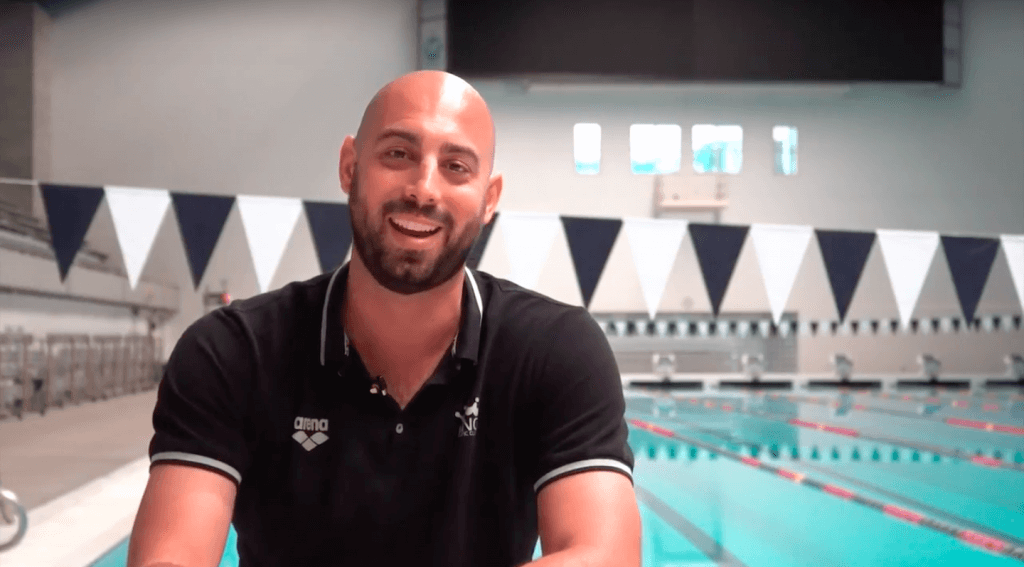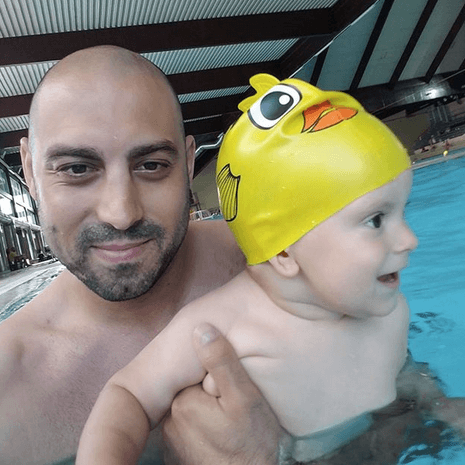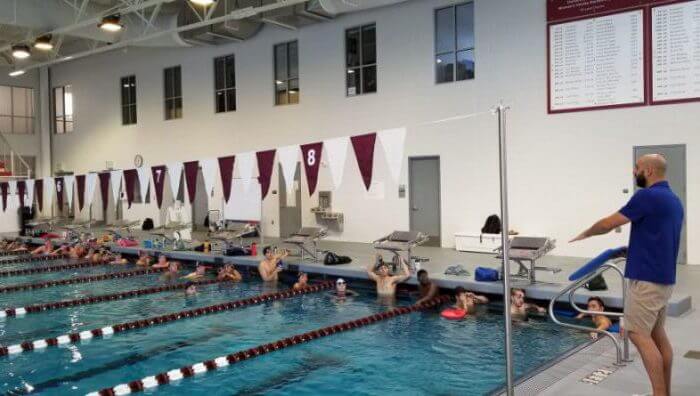The Making of Milo Cavic: Living Without Regret

By McKenna Ehrmantraut, Swimming World College Intern.
Many know Milo Cavic as the man who almost ruined Micheal Phelps’ chance of winning eight gold medals at the 2008 Beijing Olympics. Losing to Phelps in a controversial race by .01 seconds may have made Cavic a household name, but few stopped to appreciate the man who had overcome obstacle after obstacle to become an Olympic medalist in his own right.
Recently, Cavic took a coaching position at King Aquatic Club in Federal Way, Wash., and sat down to talk about his life growing up, his swimming career and his life now.

Photo Courtesy: FINIS Swim
The Formative Years
Cavic grew up in Orange County, Calif., but his family was from – as he describes it – “a very socialist country in Eastern Europe. Those eastern countries do things quite a bit differently than here in America.” Cavic tells a frightening story from his childhood about learning to swim:
Out there, the way they teach a lot of the kids to swim is by just throwing them in the water and letting them figure it out. One of my earliest memories was of my father holding me under water, drowning me. That sounds pretty intense – and it was very intense – but years and years later, I know that his goal wasn’t to drown me but to teach me to fight. When I was kicking and screaming and crying underwater, I was hitting him – this all sounds very dramatic, and it was – but he was also teaching me to fight. To fight for him; to fight for me; to fight for a breath of air. And, if I ever released the tension in my body he would know that it was time to come up. And the message that I didn’t realize until many, many, many years later is that in life, nothing is given to you.”

Photo Courtesy: Instagram, @milorad_cavic
Up until college, where Cavic meet swimmers like Nathan Adrian who were raised in a positive family and swim environment, he believed “that you had to have a chip on your shoulder to become the best of the best.” He was raised to believe that “if it didn’t break you, then you would become a champion. But, the sad truth is that this mentality will break more people then it makes.” Out of these experiences, he has learned how to challenge his own son in positive ways while continually supporting him in everything he is passionate about.
Finding His “Why”
After the 2008 Olympics, Cavic was forced to have what most would consider a career-ending back surgery. While lying in bed for six months during recovery, his heart said to get up but his body “said no,” and he “just couldn’t do it.” He kept asking himself again and again why was he putting himself through so much pain to only be able to go at an 80-percent effort?
“Why?” was a common question during Cavic’s back surgery recovery. At first, the question was why was he coming back to swimming after such a life altering procedure. His initial answer was, “I returned from back surgery not because I needed to, but because my heart told me I needed to keep going to prove myself – prove to the world – that I’m not done: to prove to all of those doctors that told me I could never swim again that they were wrong. And, I did it just so I could move on with my life.”
Cavic is always looking for the “why” in what he’s doing. If there is a why, then he is more willing to put forth the effort. This is one of the things he tries to convey to the young swimmers he coaches on his teams and at clinics around the country. He starts off by stating why a certain technique is beneficial and relates it to a goal. “Very ‘old school’ coaches just told you what to do, but this current generation of swimmers are fighting for more and more ownership in what they are doing.” If people are given a why, a motivation in other words, to do something, they will most likely try harder.

Photo Courtesy: Chris Myhre
Cavic touched fourth at the wall during the 100 fly at the 2012 Olympics, a truly heroic feat by any standards. Instead of fixating on the non-podium number by his name, he saw that his training partner, and a man who’s like a brother to him, Yevgeny Korotyshkin, had just tied for second place in lane eight. Cavic was thrilled for him but, what concerned him was that after his race, he felt nothing for himself. He asked, “Was it possible that my career just ended and I felt nothing?”
He went on for two months feeling numb. Every swimmer, parent, coach, and friend feels something after watching a race, whether that be “exhilaration, anger, happiness, sadness, or any other possible emotion.” But he felt nothing. He went to a close family friend who happened to be a psychologist and asked him for guidance, because he wanted to know why he wasn’t feeling anything about an entire career coming to a close. His friend asked, “Well, do you feel like you want to race anymore?” Cavic said no. “Do you feel like you have anything to prove?” No, again. “Do you want to keep training?” No. “Do you feel like you got everything out of swimming that you wanted?” Yes. And there it was – the moment Cavic knew it was okay to move forward in his life and away from the active competition.

Photo Courtesy: FINIS Swim
After his swimming career, Cavic became a salesman for a short time but discover he lacked a passion for it. What he really wanted to do with his life was to help serve others in some way or another, so he took his knowledge and passion for the sport and became a swim coach and a first time parent to his newborn son.
Living Without Regret
When asked what message he would give to young swimmers, he said: “Find what it is you’re passionate about, love whatever you do and find ways to be the greatest version of yourself in what it is that you do. To win is not always the goal. The goal is to live with no regret. The only way you can ever live without regrets is to do everything that you can possibly do towards whatever it is that you truly want in your life.”
Cavic quoted basketball legend Michael Jordan’s famous words: “I can accept failure; everyone fails at something. But I can’t accept not trying.” Cavic says he can sleep at night because he has no regrets with his swimming career. “Do everything possible to be as successful in your goals, if you did everything that you could have done, then there can be no regrets. The goal is not to be an Olympic champion but to be the best you can be in the one thing that you are the most passionate about.”
Learn more about Cavic on his personal website at www.swimwithmilo.com and check out other articles on Cavic from Swimming World Magazine here.




Wow. Thanks for sharing the story behind the athlete!
What a life! Thank you for sharing! I hope he thrives in Washington.
Awesome story! Wishing you the best of luck in all future endeavors. Especially, with your son ??? ??
??
Great stuff I didn’t know, thanks for sharing!
What an incredible story. What a champion. Overcoming what you went through… you’re an Olympic and life champion Cav! Keep up the good work and God bless.
Great story. Greeting from Kragujevac
Anne Emaus
Awesome
Awesome
Thank you for sharing. Very Inspirational .
What an amazing story! Thank you for sharing.